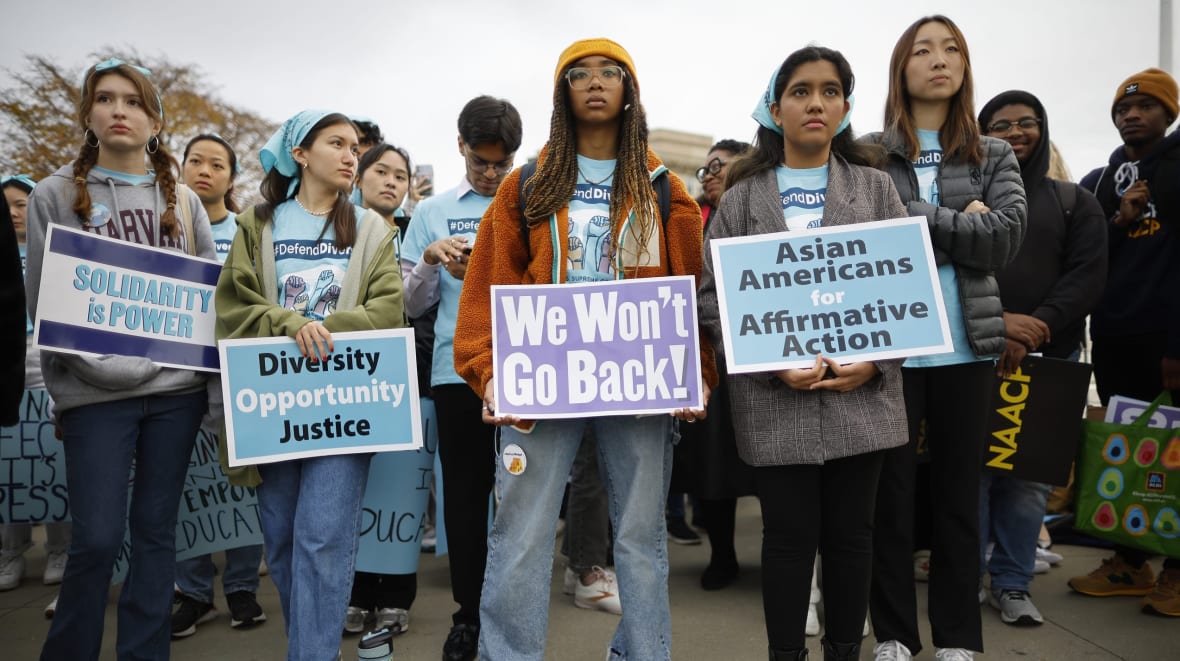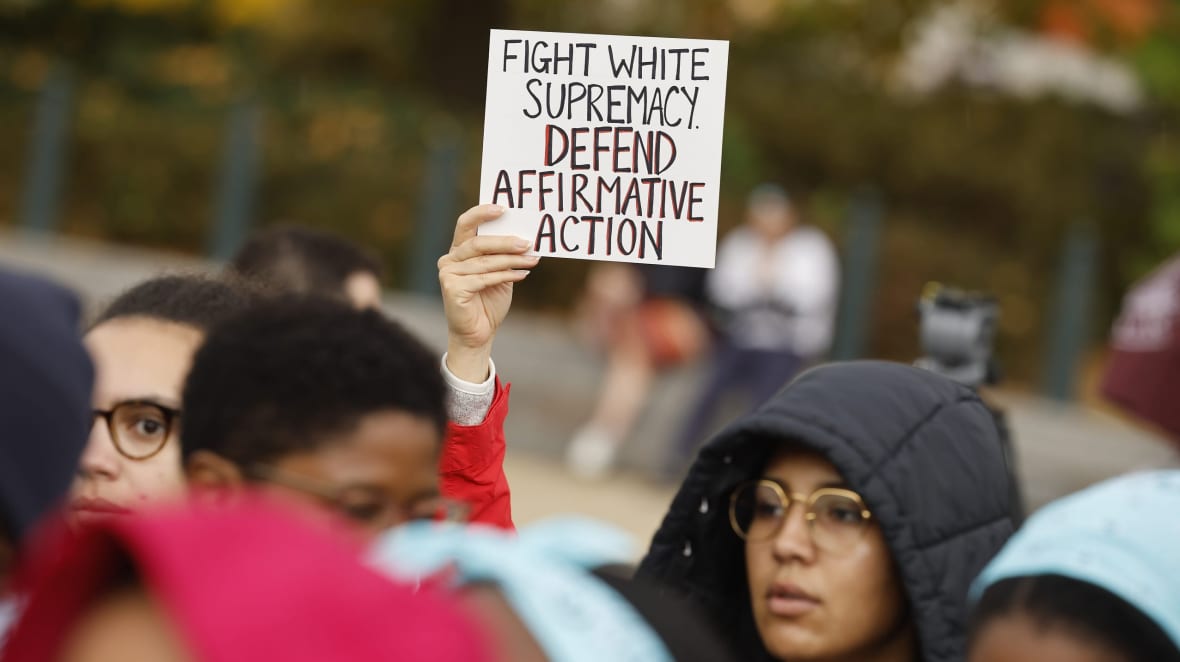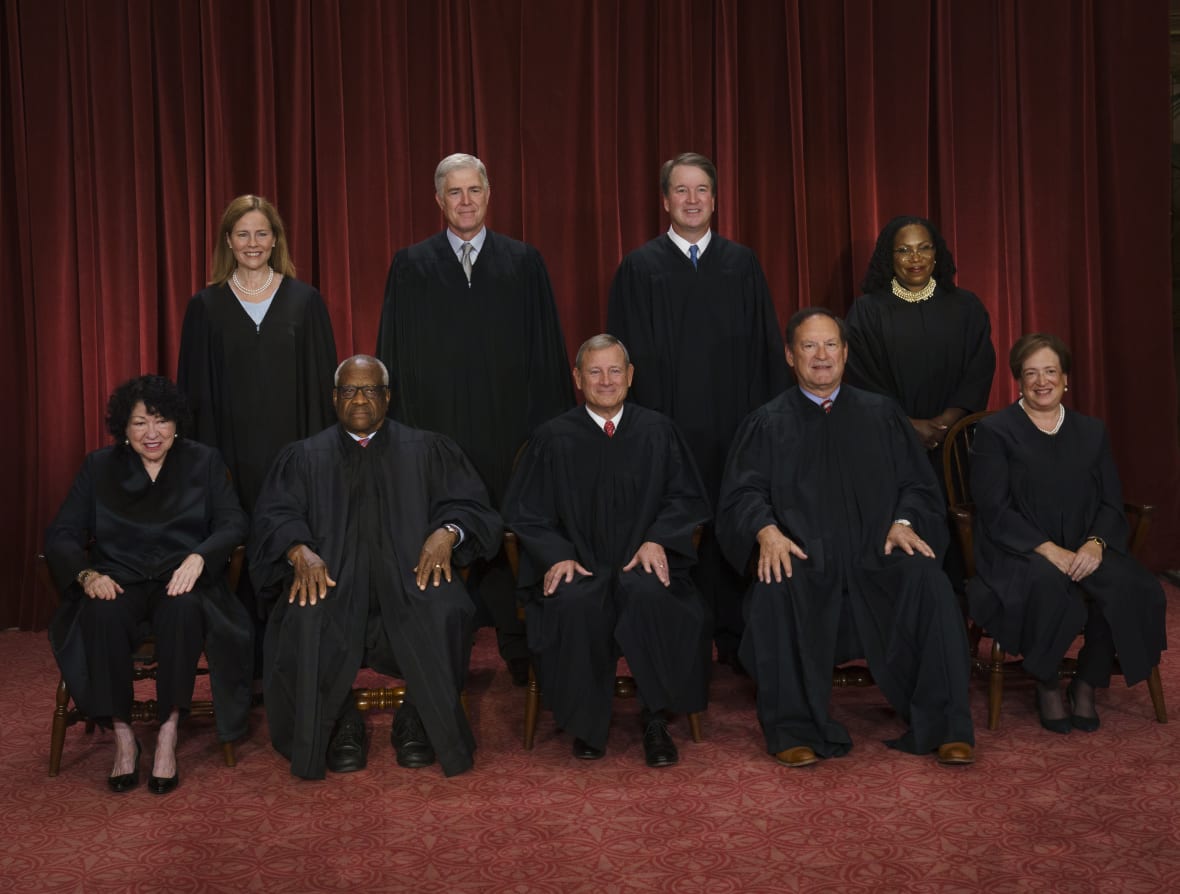Republicans are strategically working to dismantle not only affirmative action but also diversity, equity and inclusion.
April Ryan | Jun 14, 2023
Any day now, the conservative-majority U.S. Supreme Court will issue its decision on affirmative action and whether race should be a factor in the college admissions process.
Two cases are before the high court: Students for Fair Admissions v. Harvard University and Students for Fair Admissions (SFFA) v. University of North Carolina. The Harvard case argues that the university’s admissions process discriminated against Asian-American students. The case from Chapel Hill, argues that Asian and white students were the subject of discriminatory admissions practices at the school.

Any day now, the conservative-majority U.S. Supreme Court will issue its decision on affirmative action and whether race should be a factor in the college admissions process.
Two cases are before the high court: Students for Fair Admissions v. Harvard University and Students for Fair Admissions (SFFA) v. University of North Carolina. The Harvard case argues that the university’s admissions process discriminated against Asian-American students. The case from Chapel Hill, argues that Asian and white students were the subject of discriminatory admissions practices at the school.

WASHINGTON, DC – OCTOBER 31: Proponents for affirmative action in higher education rally in front of the U.S. Supreme Court before oral arguments in Students for Fair Admissions v. President and Fellows of Harvard College and Students for Fair Admissions v. University of North Carolina on October 31, 2022 in Washington, DC.
(Photo by Chip Somodevilla/Getty Images)
The cases are both backed by a wealthy white man named Edward Blum. He is the same person behind the 2016 Supreme Court case of Fisher v. University of Austin, Texas. In that case, the court ruled that race-based admissions was lawful. However, the collective, unscientific belief among Black thought leaders is that affirmative action in college admissions will be overturned by the current Supreme Court.
Republicans are strategically working to dismantle not only affirmative action but also diversity, equity and inclusion. Arkansas Governor Sarah Huckabee Sanders banned critical race theory in schools as well as the use of the term Latinx. In Florida, Governor Ron DeSantis banned AP African American studies, cut funding for diversity, equity and inclusion programs for state colleges, as well as challenging the rights of other groups like the LGBTQ+ community in its fight with the Disney corporation.
And on Capitol Hill, the Republican-led House of Representatives is overseeing the elimination of the civil rights panel and a House finance diversity panel. The House Judiciary Committee also has lost its civil rights subcommittee. This is happening as corporate America is ending a large number of DEI programs in the private sector.
The cases are both backed by a wealthy white man named Edward Blum. He is the same person behind the 2016 Supreme Court case of Fisher v. University of Austin, Texas. In that case, the court ruled that race-based admissions was lawful. However, the collective, unscientific belief among Black thought leaders is that affirmative action in college admissions will be overturned by the current Supreme Court.
Republicans are strategically working to dismantle not only affirmative action but also diversity, equity and inclusion. Arkansas Governor Sarah Huckabee Sanders banned critical race theory in schools as well as the use of the term Latinx. In Florida, Governor Ron DeSantis banned AP African American studies, cut funding for diversity, equity and inclusion programs for state colleges, as well as challenging the rights of other groups like the LGBTQ+ community in its fight with the Disney corporation.
And on Capitol Hill, the Republican-led House of Representatives is overseeing the elimination of the civil rights panel and a House finance diversity panel. The House Judiciary Committee also has lost its civil rights subcommittee. This is happening as corporate America is ending a large number of DEI programs in the private sector.

Also Read:
Some words of advice for incoming college freshmen
Legal scholars and analysts have questioned that if the Supreme Court does remove race as a factor in the admissions process, what will be the far-reaching impact on Black students applying for admission to predominantly white institutions?
Bakari Sellers, a former member of the South Carolina Statehouse and TV political analyst, told theGrio there is a “slippery slope” as we wonder “what happens next?”
The court’s ruling could potentially place a bullseye on the landmark 1954 decision of Brown v. Board of Education, which led to the integration of U.S. public schools. There could also be an impact in civil rights laws in the broader context as well. Sellers says this idea centers around how the decision reads.
“I can tell you that I don’t think it is far-fetched to say certain constitutionalists and certain legal scholars do want to overturn Brown v. the Board of Education,” Sellers said.

WASHINGTON, DC – OCTOBER 31: Proponents for affirmative action in higher education rally in front of the U.S. Supreme Court on October 31, 2022 in Washington, DC.
(Photo by Chip Somodevilla/Getty Images)
He is skeptical that Brown v. Board will be overturned in his lifetime. However, the outspoken lawyer also said, “We’re starting to see how the fact that Democrats haven’t taken the judiciary seriously for decades, and it is impacting the future of this great country – particularly the diversity or the lack thereof.”
DEI expert Y-Vonne Hutchinson, CEO and founder of ReadySet, an organization that helps companies attract and retain diverse talent, firmly stated it “is going to be incredibly hard when people don’t have access to the educational opportunities precluded on the basis of race.”
Hutchinson said this potential overturning of affirmative action would have a direct impact on Black and brown students in admissions and scholarships. And when it comes to the current anti-woke rhetoric coming from the Republican Party, she affirms, “I see this as part of a rollback on civil rights and our access to opportunity. She added, “I think the impact of this kind of decision will be deeply felt.”
Sellers agrees and says he expects that the court will rule against affirmative action. “Much like you had Justice [Samuel] Alito dedicate his entire career to gutting and eliminating Roe v. Wade. You will have a similar situation with Clarence Thomas and affirmative action.”
He believes that intentional efforts by Justice Thomas will mean that “African-Americans will have a great deal of trouble having the same opportunities for higher education.”

He is skeptical that Brown v. Board will be overturned in his lifetime. However, the outspoken lawyer also said, “We’re starting to see how the fact that Democrats haven’t taken the judiciary seriously for decades, and it is impacting the future of this great country – particularly the diversity or the lack thereof.”
DEI expert Y-Vonne Hutchinson, CEO and founder of ReadySet, an organization that helps companies attract and retain diverse talent, firmly stated it “is going to be incredibly hard when people don’t have access to the educational opportunities precluded on the basis of race.”
Hutchinson said this potential overturning of affirmative action would have a direct impact on Black and brown students in admissions and scholarships. And when it comes to the current anti-woke rhetoric coming from the Republican Party, she affirms, “I see this as part of a rollback on civil rights and our access to opportunity. She added, “I think the impact of this kind of decision will be deeply felt.”
Sellers agrees and says he expects that the court will rule against affirmative action. “Much like you had Justice [Samuel] Alito dedicate his entire career to gutting and eliminating Roe v. Wade. You will have a similar situation with Clarence Thomas and affirmative action.”
He believes that intentional efforts by Justice Thomas will mean that “African-Americans will have a great deal of trouble having the same opportunities for higher education.”

Oct 7, 2022; Washington, DC, USA; Members of the Supreme Court pose for a group photo at the Supreme Court. Seated from left: Associate Justice Sonia Sotomayor, Associate Justice Clarence Thomas, Chief Justice of the United States John G. Roberts, Jr., Associate Justice Samuel A. Alito, Jr. and Associate Justice Elena Kagan. Standing behind from left: Associate Justice Amy Coney Barrett, Associate Justice Neil M. Gorsuch, Associate Justice Brett M. Kavanaugh and Associate Justice Ketanji Brown Jackson. Mandatory Credit: Jack Gruber-USA TODAY
A decision to change how affirmative action is administered is a double-edged sword. “HBCUs may benefit; I think individuals who want to go to PWIs [will have] a lot more trouble getting in, and you’ll see some PWIs lose the diversity if they have today,” said Sellers.
Susan Rice, Biden’s former domestic policy adviser, gave some insight into the Biden administration’s thinking on this matter as she was departing her post last month. Rice told theGrio exclusively, “Obviously, we are watching what might happen in the Supreme Court carefully. I don’t want to presume outcomes.” When challenged about the expected overturn, she acknowledged, “we are focused on all potential outcomes.”
In his first few months as president, Biden issued an executive order on diversity, equity, inclusion and accessibility in the federal workforce.
A decision to change how affirmative action is administered is a double-edged sword. “HBCUs may benefit; I think individuals who want to go to PWIs [will have] a lot more trouble getting in, and you’ll see some PWIs lose the diversity if they have today,” said Sellers.
Susan Rice, Biden’s former domestic policy adviser, gave some insight into the Biden administration’s thinking on this matter as she was departing her post last month. Rice told theGrio exclusively, “Obviously, we are watching what might happen in the Supreme Court carefully. I don’t want to presume outcomes.” When challenged about the expected overturn, she acknowledged, “we are focused on all potential outcomes.”
In his first few months as president, Biden issued an executive order on diversity, equity, inclusion and accessibility in the federal workforce.

Also Read:
A DEI expert’s advice on spotting a safe workplace 
He also ordered his cabinet to implement efforts to lead by example. One of those examples is at the Department of State, where outgoing Chief DEI Officer Gina Abercrombie-Winstanley worked with unions to create a new employee handbook that makes the idea of DEI more of a permanent feature no matter the administration.
There is an understanding at the State Department, which is majority white and male, that women and minorities must have more chances at unbiased opportunities at the agency.
But even as the State Department works to strengthen its equity and inclusion efforts, hired and promotions, they say, is based on one’s work and record. “Everyone wants to know that they work in some place that is fair and that is just,” Abercrombie-Winstanley told theGrio. “That will recognize people for their talent and what they bring to the table.”
No comments:
Post a Comment